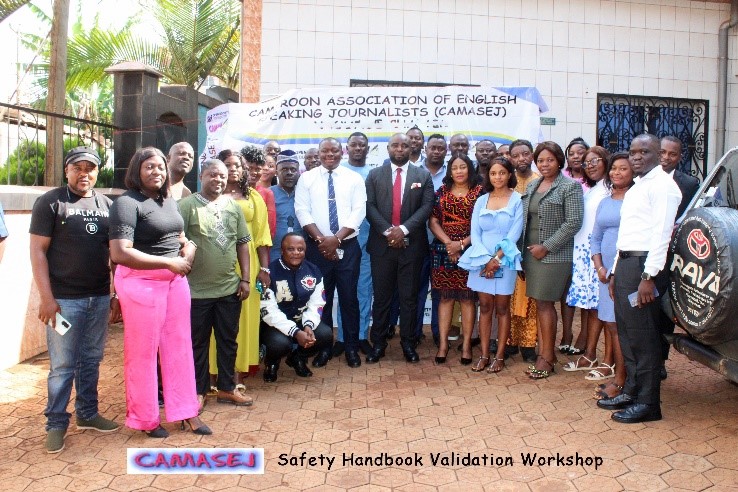The Cameroon Association of English-Speaking Journalists, CAMASEJ, has validated a safety handbook aimed at enhancing the skills of journalists reporting in elections and conflict zones in Cameroon.
The safety handbook was validated in Bafoussam during a seminar titled, “Elections Reporting and CAMASEJ Safety Handbook Validation Workshop,” which took place from June 12-13. The seminar brought together approximately 30 journalists from various chapters of the association.
This seminar is part of the ongoing three-year implementation of the Open Society Programme, which optimises media engagement and peace efforts in the Northwest and Southwest Regions of Cameroon through increased media participation.
Speaking during the seminar, the president of CAMASEJ, Jude Viban, stressed the importance of the handbook, stating that it serves as a working document for every journalist, equipping them with the necessary skills and measures to report safely in the Northwest and Southwest Regions.
“This handbook is a working document for every journalist to hold so that they can acquire skills and ideas on measures to take in order to safely report from the Northwest during elections,” Jude Viban said.
Emphasizing the crucial role of the media in the upcoming elections, particularly in conveying messages to the public so they can make informed choices about candidates, he stated that journalists must prioritise their safety.
While urging members to be responsible, he encouraged them to act as ambassadors. As they leave the seminar and return to their chapters, they should share the knowledge they have gained with their colleagues.
“We expect those who are here to be the relay point, so when they return to their various chapters, they can share what they have learned,” he said, adding, “We should view seminars as opportunities to build our capacity and the capacity of others because, with enhanced skills, you can take care of yourself.”
Regarding the selection process for the seminar, organisers mentioned that the association aims to provide everyone with the opportunity to participate in all activities organized by the association.
Presenting the draft handbook, Eugene Ndi noted that it comprises four chapters and serves as a reporting guide, particularly for journalists in conflict-affected regions.
“It includes guidelines for both online and offline safety, offering practical tips on preparation before covering a story and protocols to follow during coverage,” he said, adding, “It is a set of tools to guide you in the field and helps you carry out risk assessments.”
In addition to validating the safety handbook, participants engaged in discussions on the evolution of reporting in Cameroon, from traditional to new media. A session on reporters’ safety and security during elections, story pitching, and gender mainstreaming in election reporting also took place.
“Every hostile environment is different, and it is not possible to establish a set of rules or provide bulletproof guidance that will keep everyone safe at all times and in every situation,” Blaise Amindeh remarked during one of the sessions.
“The pursuit of journalism inherently involves some risk, but remember, no story is worth your life.”
By Etienne Mainimo Mengnjo

